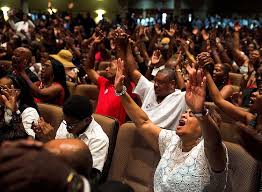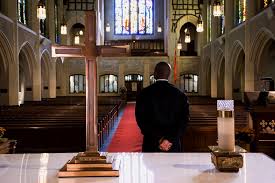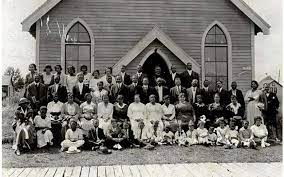I’ll tell you, one of the most divisive statements that serve no purpose other than to disrupt Black solidarity is the old refrain that Black folks are not monolithic. This statement is one of the few that possesses the power to be simultaneously partially true and partially false. Now, I agree that Black people are not monolithic on most things; however, I also realize that there are points of agreement.
One of the most prominent points of agreement among Black men is that a relationship with God/Allah is crucial. If you are ever so privileged to have access to the private spaces that Black men go after battling a burdensome society, you will find the majority of them deep in meditation, thought, or prayer. Wise Black men understand that only our significant connection to God/Allah maintains our sanity. It is God/Allah that shelters us after we have sheltered, protected, and nurtured our wives, children, brothers, and sisters who rely on us without much of a second thought.

In many ways, it is nonsensical to believe that Black men existing in the same land that enslaved, hunted, lynched, incarcerated, marginalized, and disrespects them daily have “made it through” without the never-changing hand of a higher power. Yet, I and droves of other Black men do not attend Sunday service with much regularity.
What has driven so many Black men from church pews?
As a historian and Black Nationalist who has dedicated his entire life to the liberation and salvation of the Black nation, I know very the politico-economic strength that the church can generate; its power is unlike any other American institution. Black religious institutions gifted us with Nat Turner, Ella Baker, Bishop Henry Mcneal Turner, Malcolm X, the Rev. Dr. Martin Luther King Jr., the Rev. Dr. Johnny R. Heckard, and Fred Shuttlesworth. Each of the above individuals used some Black religious institution to gather, organize, and guide our people toward elusive freedom. During even the toughest of times, Black men have turned to the praise house searching for like-minded individuals and their God.
Although I am confident that Black Pastors/Preachers will take significant issue with the following assertion, however, I fervently believe that what has changed in the relationship between Black Men and the Black Church is the lack of usefulness of the sermons emanating from the pulpit.
One does not need to search far to find Black men who will tell you that the message delivered by many of the most high profile Preachers have no relevance to their current station in life. It appears that the training Black clergy receive from White theological schools has rendered them mainly useless to Black folks in desperate need of tangible gains that are only accessible through large-scale social movements and a steep increase in knowledge. If I did not know any better, I would believe that the Black clergy is willing to turn a blind eye toward earthly suffering as long as their poor and working-class congregants make it up to yonder to see their Lord.
Many Black men dismiss any engagement with the Black Church with a quip of “it doesn’t seem to have the power that it used to back in the day.”
According to the Pew Research Center, these men have much company in their pessimistic view of sermonic content in today’s Black Church. A Pew poll reveals that 62% of Black folks consider it important that Black Pastors/Preachers address the politico-economic and social issues that impact them and their loved ones. A significant 23% of Black respondents felt addressing political and social issues essential to the Black Clergy’s duties.
Ironically, a Black Church that historically taught patriarchy and racial solidarity against enemies is now telling Black Men that if only they lived correctly and sought refuge in the Lord, their problems would disappear. Such a message is a deliberate misapplication of the Gospel and popular musical expressions such as the song, “The Battle’s Not Yours, It’s the Lords.”

Life’s experiences have taught Black men that this earthly battle is one that they have to fight; however, they will accept otherworldly assistance if offered. Until Black Pastors/Preachers abandon emotional theatrics designed to excite congregants momentarily and return to that old-time religion of rallying Black folks around political goals, economic solidarity, and social restraint Black men will never return to the praise house in significant numbers. Without the above alteration, there isn’t much of a reason to attend Sunday Service. No reason at all!!!!!
MRCi discussions occur every Thursday @ 7:30 (EST) – 6:30 (CST). Click on the link below to join our intellectual community.
Join us as we discuss pressing matters facing and impacting Black Men and Black America.
Just in case you can not get the link to work, use the information to join the Zoom session.
Meeting ID: 353 334 8869
Passcode: 1YF4BG
James Thomas Jones III, Ph.D.
©Manhood, Race, and Culture, 2021

“It appears that the training Black clergy receive from White theological schools has rendered them mainly useless to Black folks in desperate need of tangible gains that are only accessible through large-scale social movements and a steep increase in knowledge.” This is a very interesting comment; and, certainly a great place to start.